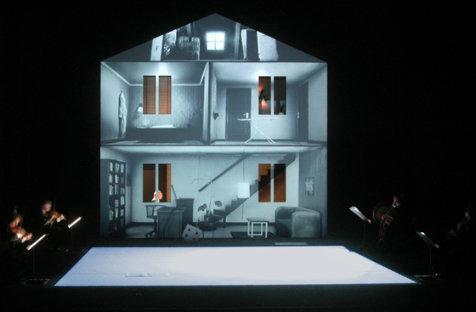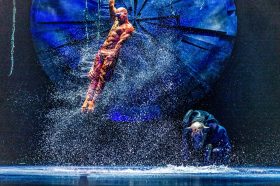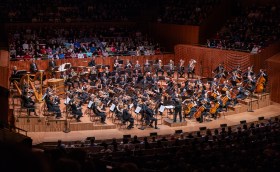Eraritjaritjaka is a restlessly innovative piece of theatre, baffling and brilliant by turns – sometimes simultaneously. Devised by the composer and director Heiner Goebbels, it combines live music by the tireless Mondrian Quartet, on-stage performance and live video, and centres on a single actor, André Wilms, making philosophical declarations from a script constructed mostly from the collected notes of the writer Elias Canetti.
Wilms, wearing a cream-coloured three-piece suit, is billed in the program simply as Actor. There are moments when he seems to inhabit a character – perhaps a version of Canetti himself – but most of the time he is describing ideas, announcing them to us, confronting us with them.
The ideas are hypothetical, bizarre, utopian or dystopian, and frequently impossible, absurd or surreal: a society in which children are the executioners, to save the adults from getting blood on their hands. Often, they implicitly criticise societal values, or, by taking them to extremes, estrange the familiar – that is, allow us to see it from the outside. Each idea is self-contained, with a pause to allow it to take shape in our minds before the next one replaces it. The music does not fall away when the actor speaks; rather, music and speech compliment and counterpoint each other, the words buoyed up by, or cutting across, the dramatic flourishes and crescendos of the quartet.
If all this sounds very conceptual, antithetical to the demands of drama – it is. The audience is granted no objective perspective on the action. Instead, we are invited to share in an intense subjectivity in which events take second place to notions, liberated from uses to which they are usually put, neither marshalled into a coherent argument nor sugar-coated with dramatic elements: mimesis, character, plot.
Though the words are spoken only by one actor, they are too discontinuous to form a monologue: each aphorism is summoned into being and then pops, like a bubble, as the next takes its place. One particular pronouncement sounds like a motto for the show: n’explique jamais; dis, et disparais (never explain: say it, and vanish). It is radical, risky stuff – but does it work as a piece of theatre?
Surprisingly, it does, to a large extent. Eraritjaritjaka blends the intellectual with the spectacular. The visual conceit of the show is a giant video projection on the back of the stage, in the shape of a house, with long blank rectangles for the windows. The video is mostly live, although there must be some trickery going on, for it follows Wilms, shot from a carry-cam, out of the theatre, along the street, into a convenience store, and then into the back seat of a car (where he delivers more dream-like imaginings of alternative worlds) and finally into a flat where – well, see the show. The surprise is worth preserving.
There are two moments, exceptions to the rule, when there is a suggestion of a story, and André Wilms’s character interacts with others: a boy who comes to his door, to talk about his library and Chinese ideograms, and a woman who is returning after a long absence. These characters are disembodied voices; they are seen neither on stage nor on the video projection. The conversation at the doorstep is shown onscreen, from the perspective of the boy. The woman is even less definitely located. We hear her as if from outside the door, but there is no-one there when Wilms opens it. She might be a daydream, or a phantom: she is present just enough to underscore her absence.
There are times when one’s attention flags under the show’s conceptual weight. But in the main, for a production with such an appetite for risk, it’s very enjoyable. Eraritjaritjaka’s main flaw is its subtitles. The whole script is in French, and three large screens (one on each side of the stage, and one above it) show an English translation as the words are spoken. Unlike a subtitled film, in which the action and text is in sufficient proximity to be viewed practically simultaneously, to read these ones requires a turn of the head. It’s very distracting to keep flicking one’s eyes back and forth. And because the words are so important, it’s not the kind of show you can just watch without understanding. The translation is also very poorly suited to the accompanying dramatic delivery of the original text. Natural word-order in the destination language may make for a smoother translation on the pages of a book, but when the actor ends his sentence on a shout, you want to know which word he’s emphasising, and very often, the subtitles would mislead you. A more literal, less smooth translation would have worked much better.
I can recommend Eraritjaritjaka whole-heartedly to anyone fluent in French, and with only a slight reservation to someone like me with a patchy knowledge of the language. If you have no French, make sure you get a seat in the middle of the gallery: that’s probably the position in which the subtitles are least distracting.
Rating: 4 stars out of 5
Eraritjaritjaka
Théâtre Vidy-Lausanne
Director and Composer: Heiner Goebbels
Performed by André Wilms
Theatre Royal, MLC Centre
9 – 13 January
Sydney Festival 2013
www.sydneyfestival.org.au
5 – 27 January





